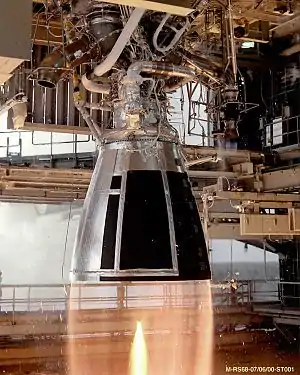NK-15
The NK-15 (GRAU index 11D51) is a rocket engine designed and built in the late 1960s by the Kuznetsov Design Bureau. The NK designation is derived from the initials of chief designer Nikolay Kuznetsov. The NK-15 was among the most powerful LOX/RP-1 rocket engines when it was built, with a high specific impulse and low structural mass. It was intended for the ill-fated Soviet N-1 Moon rocket.
| Country of origin | Soviet Union |
|---|---|
| Date | 1960s |
| Designer | Kuznetsov Design Bureau |
| Application | 1st/2nd-stage engine |
| Successor | NK-33 |
| Liquid-fuel engine | |
| Propellant | LOX / kerosene |
| Cycle | Staged combustion |
| Pumps | Turbopump |
| Performance | |
| Thrust (vac.) | 1,753 kN (394,000 lbf) |
| Thrust (SL) | 1,505 kN (338,000 lbf) |
| Throttle range | 50–105% |
| Thrust-to-weight ratio | 137 |
| Chamber pressure | 14.50 MPa (2,103 psi) |
| Isp (vac.) | 331 seconds (3.25 km/s) |
| Isp (SL) | 297 seconds (2.91 km/s) |
| Dimensions | |
| Length | 3.7 m (12 ft) |
| Diameter | 2 m (6 ft 7 in) |
| Dry weight | 1,247 kg (2,749 lb) |
History
The engine equipped the N1 rocket which had four consecutive launch failures all due to this engine. Its successor the NK-33 allowing multiple fire resistance tests and increased life service was to be used on the N1F, a new version of the N1, but the program was canceled.
Versions
- NK-15V (GRAU index 11D52): Modified NK-15 optimized for vacuum operation, used on the N1 second stage.
See also
External links
This article is issued from Wikipedia. The text is licensed under Creative Commons - Attribution - Sharealike. Additional terms may apply for the media files.
